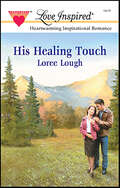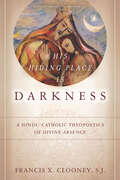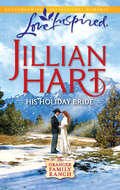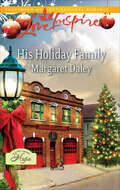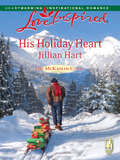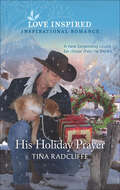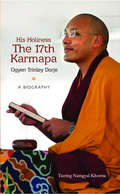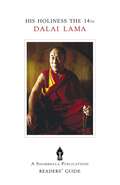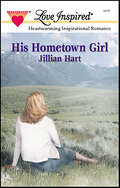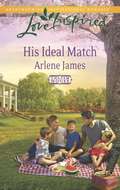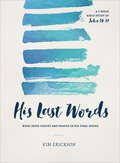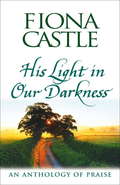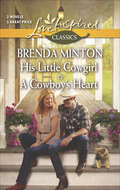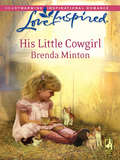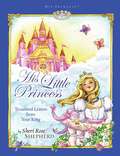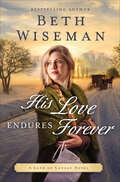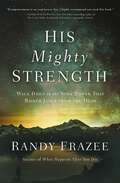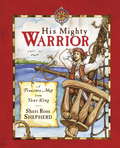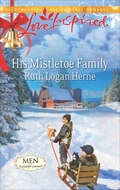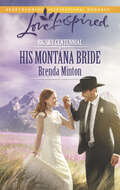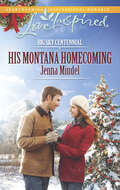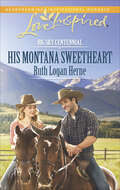- Table View
- List View
His Healing Touch
by Loree LoughAs a boy, Adam Thorne participated in a prank that went horribly wrong. Having no adult in his life to teach him that, with a changed heart, no sin is unforgivable, he turned his guilt into a shield......until Kasey Delaney bounded into his world, bubbling with life and overflowing with enthusiasm for God's love.Months into their whirlwind courtship, Adam still hadn't revealed his shameful secret. But could he bear the loneliness if Kasey couldn't set aside her pain and anger and see him for the man he had become, rather than the boy he had been? Or would God, in His infinite wisdom, give Adam the strength to unburden his heart and rejoice in the healing power of love?
His Hiding Place is Darkness: A Hindu-Catholic Theopoetics of Divine Absence
by Francis X. ClooneyHis Hiding Place is Darkness explores the uncertainties of faith and love in a pluralistic age. In keeping with his conviction that studying multiple religious traditions intensifies rather than attenuates religious devotion, Francis Clooney's latest work of comparative theology seeks a way beyond today's religious and interreligious uncertainty by pairing a fresh reading of the absence of the beloved in the Biblical Song of Songs with a pioneering study of the same theme in the Holy Word of Mouth (9th century CE), a classic of Hindu mystical poetry rarely studied in the West. Remarkably, the pairing of these texts is grounded not in a general theory of religion, but in an engagement with two unexpected sources: the theopoetics, theodramatics, and theology of the 20th-century Catholic theologian Hans Urs von Balthasar, and the intensely perceived and written poetry of Pulitzer Prize winner Jorie Graham. How we read and write on religious matters is transformed by this rare combination of voices in what is surely a unique and important contribution to comparative studies and religious hermeneutics.
His Holiday Bride
by Jillian HartBig-city sheriffs don't belong in tiny Wild Horse, Wyoming. At least that's what rancher Autumn Granger thinks when handsome Ford Sherman sweeps into town and sets his sights on her. A country cowgirl, she can'tpossiblybe his match. Like most newcomers, he'll eventually get restless with small-town life and leave it-and her-behind. But when rustlers attack her family's ranch, Ford helps her protect Granger territory. She finds herself hoping that he really is in Wild Horse to stay. Could her holiday wish of a happily ever after with this handsome lawman come true?
His Holiday Family (A\town Called Hope Ser. #1)
by Margaret DaleyWhen disaster strikes a Southern town, a firefighter and a single mother put their faith in rebuilding—and each other—in this uplifting holiday romance.When Hurricane Naomi tears through a small Mississippi town, a daring rescue unites two heroes. Nurse Kathleen Hart is a single mom racked by guilt over her husband’s death. Firefighter Gideon O’Brien—orphaned as a young boy—has lost too many people he cared for. To rise above the storm’s devastation, Gideon helps Kathleen and her sons rebuild their home. As Christmas approaches, they discover that even the strongest of storms can’t destroy a romance built on the foundation of faith.
His Holiday Heart
by Jillian HartWhat can make a grumpy "there-is-no-Santa-Claus" kind of man smile? The sight of quirky Lucy Chapin. Something about the woman creates warm and fuzzy feelings within confirmed bachelor Spence McKaslin. So he'll just have to ignore her. Hard to do, since they're working together on a Christmas program for hospitalized children. The time with lovely Lucy soon has Spence thinking twice about spending his life alone. Because his heart is open to giving and receiving.
His Holiday Prayer (Hearts of Oklahoma #3)
by Tina RadcliffeIn this inspirational romance, a single father ready to start over in a new town discovers love in his hometown with his best friend and work colleague.A new beginning could be closer than he thinks.After receiving an unexpected job offer in Texas, widower Tucker Rainbolt decides he and his twins need a fresh start. But moving on means leaving his best friend, Jena Harper, and their vet clinic behind. For the first time, Tucker sees Jena as more than a buddy. What if leaving isn’t the answer? Maybe what he’s been missing has been right beside him the whole time . . .
His Holiness The 17th Karmapa Ogyen Trinley Dorje: A Biography
by Tsering Namgyal KhortsaA fascinating and riveting life sketch of one of the most respected spiritual leaders of our times, which also delves deep into the various facets of Buddhism . . . The seventeenth Karmapa, Ogyen Trinley Dorje, is the leader of the Karma Kagyu School, one of the four main schools of Tibetan Buddhism. Born in 1985 in eastern Tibet to nomadic parents, he was recognized as the reincarnation of the sixteenth Karmapa who passed away in the US in 1981. He became the first Tibetan reincarnation to be recognized by both the Dalai Lama and the Chinese Government. The 15-year-old monk made headlines when he escaped to India in 2000. Currently living near Dharamshala (in Himachal Pradesh, India), the Karmapa is widely seen as an important spiritual leader of the twenty-first century. Over the past decade and a half, he has grown up into a formidable leader and an impressive orator. Behind the façade of scandals and controversies surrounding the Karmapa is an extraordinary young man, full of charisma and intelligence. Yet few know who the Karmapa is and what he believes in. What are his teachings and what is his vision for the world? How is he restoring his 900-year-old Tibetan Buddhist institution of which he is the head? In a unique mixture of biography, travelogue and reportage, the author brings alive the life of the Karmapa, who is grappling with immense challenges to modernize spirituality, while keeping its essence alive. Here is a timely volume that is highly relevant today given the worldwide attention on the developments in Tibet and its impact on Beijing.
His Holiness the 14th Dalai Lama: A Reader's Guide
by Shambhala PublicationsThis is a short guide to the works of His Holiness the Fourteenth Dalai Lama, offering most especially a quick glimpse of His Holiness's books published in English by Shambhala Publications (including Snow Lion). It includes information on books both for practicing Buddhists and for general readers.
His Hometown Girl
by Jillian HartSmall-town mechanic Zachary Drake had no illusions about his longtime friendship with winsome, wholesome Karen McKaslin-even after she called off her wedding to the local pastor. Zach simply intended to lend a grease-stained hand and a sympathetic ear to a pal in need, and keep his secret longing to himself....Having narrowly escaped a loveless marriage, Karen was counting her blessings. Now she could transform herself into a woman worthy of being loved for all eternity. She never dreamed Mr. Right was waiting for her on the wrong side of the tracks, praying she'd see in his eyes what he didn't dare say....
His Ideal Match
by Arlene JamesTaming The Wanderer's Heart Carissa Hopper's always been strong and self-sufficient. So when the single mom of three finds herself in need, accepting help from the rugged and adventurous Phillip Chatam isn't easy. She knows he's the kind of man she should stay far away from. Still, when his aunts offer her lodging at Chatam House, where Phillip also resides, Carissa can't refuse. Always on the move, Phillip has no interest in settling down. But as he gets to know Carissa's adorable children-and falls for their mother-he realizes that his biggest adventure will be convincing Carissa to let him be a part of her future. Chatam House: Where three matchmaking aunts bring faith and love to life.
His Image, My Image
by Josh Mcdowell"A strong and positive self-image is intensely desired in today's self-centered world. But is such an image an important or even legitimate quest for the Christian, who is commanded to forget self in order to glorify God and serve others? In His Image ... My Image, Josh McDowell turns to the Bible to show that Christians actually serve God and others in the best manner possible once they have realized and experienced the high worth they possess in the mind and heart of God. But, are being made in the image of God (His Image) and consistently living that reality (My Image) two different things? Relating both personal experiences and those of others, Josh examines how a poor view of self is often molded in early childhood. Then he shows how the heavenly viewpoint of who we are -- our only basis for a true self-image -- can take root in a Christian's heart and mind."
His Intimate Presence: Experiencing the Transforming Power of the Holy Spirit
by Bill BrightThe God revealed in the Bible loves us and has a wonderful plan for us. For us to experience God's nearness, we must have a right understanding of who He is. Today's world offers many alternative "gods" to whom we can pray: Allah, Buddha, a Higher Power, and even our "higher self"! There is only one true God and He exists as Three Persons in One, God the Father, God the Son, and God the Holy Spirit. We accept by faith what the Bible tells us about God and that He sent His Son to die for us on the cross so we may have an intimate and right relationship with God.The Holy Spirit is co-equal with God the Father and God the Son. He possesses all of the attributes of God.
His Last Words: What Jesus Taught and Prayed in His Final Hours (John 13-17)
by Kim EricksonImagine knowing you only have several more hours to live. Picture the faces of your loved ones gathered around you. Allow the emotions to rise up in your heart. What would you say?John 13–17 records Jesus&’ last words to the disciples before His death, revealing what was most important to Him. When we study those words and prayers today, we enter deep into the heart of Jesus and come away changed: overwhelmed by the love of God, inspired to follow Him, and empowered to spread the gospel. His Last Words is an 7-week Bible study that plumbs the depths of Jesus&’ final teachings to the disciples. It features:A verse-by-verse study of John 13–17 and portions of John 18–21Five lessons each week, one set aside for reflection and prayerDiscussion questions for small groupsTwo weeks for review, reflection, and application and moreJesus&’ last words are words of eternal life—powerful and full of love. If you&’ve been longing for more intimacy in your relationship with God, more meaning in your life, and more boldness in your witness, His Last Words will draw you into just what you need: the Word of God.
His Last Words: What Jesus Taught and Prayed in His Final Hours (John 13-17)
by Kim EricksonImagine knowing you only have several more hours to live. Picture the faces of your loved ones gathered around you. Allow the emotions to rise up in your heart. What would you say?John 13–17 records Jesus&’ last words to the disciples before His death, revealing what was most important to Him. When we study those words and prayers today, we enter deep into the heart of Jesus and come away changed: overwhelmed by the love of God, inspired to follow Him, and empowered to spread the gospel. His Last Words is an 7-week Bible study that plumbs the depths of Jesus&’ final teachings to the disciples. It features:A verse-by-verse study of John 13–17 and portions of John 18–21Five lessons each week, one set aside for reflection and prayerDiscussion questions for small groupsTwo weeks for review, reflection, and application and moreJesus&’ last words are words of eternal life—powerful and full of love. If you&’ve been longing for more intimacy in your relationship with God, more meaning in your life, and more boldness in your witness, His Last Words will draw you into just what you need: the Word of God.
His Light in Our Darkness: An Anthology of Praise
by Fiona CastleFiona Castle's anthologies have been very popular. In her latest she primarily addresses women and in a beautiful collection of poetry and prose she explores the theme of thankfulness and gratitude. Preceded by a very personal introduction by Fiona, and linked with her own reflections, HIS LIGHT IN OUR DARKNESS guides the reader through the weeks of the year, combining the natural seasons with the Christian festivals. Inspiring and thought provoking this is a perfect companion to prayer.
His Little Cowgirl & A Cowboy's Heart
by Brenda MintonIn these two inspirational romances, two women must learn to trust the rodeo men who love them. His Little CowgirlSix years ago, cowboy Cody Jacobs left behind the woman he loved. Now he’s come to make amends—only to discover the daughter he didn’t know about. Can single mother Bailey Cross trust him with their child’s heart—and her own?A Cowboy’s HeartFormer rodeo star Clint Cameron is used to taking care of everyone. His family, friends and especially his twin four-year-old nephews. Yet his stubborn, beautiful neighbor, Willow Michaels, keeps pushing him away. She’s hesitant to trust him, but Clint is not about to let her walk away.
His Little Cowgirl: A Wholesome Western Romance
by Brenda Minton"She's Your Daughter."The adorable girl in pink cowboy boots is his child? Six years ago, rodeo star Cody Jacobs left the woman he loved without looking back. Now, with newfound faith, he's come to make amends-only to discover the daughter he didn't know about. Struggling single mother Bailey Cross is rightfully wary to trust him with their child's heart-and her own. But Cody's not running away again. Hearing his little cowgirl call him "Daddy" has changed him. Suddenly, something else is more important than riding bulls and winning titles: a first chance at fatherhood. And a second chance at love.
His Little Princess: Treasured Letters from Your King A Devotional for Children (His Princess)
by Sheri Rose Shepherd Lisa Marie BrowningA True Fairy Tale Cinderella is a great story, but after the last page is turned, little girls can't look forward to the tale coming true when they grow up. It's just "for pretend." Now girls ages four to nine can unveil the reality of their royal calling! His Little Princess shows them that they are not pretend princesses...because God is for real! When a grown-up sits down to read out loud these touching love letters, girls will come to understand and embrace how much they are truly loved and adored by God, the King of kings! A Daughter of the King Every little girl dreams of being a princess. And for the one who trusts in God, the Word heralds a most beautiful truth: She is the chosen daughter of the King of all kings. She is a true princess! Here is a majestic gift for that special young one in your life--personal letters written from her King. Each day a new letter will inspire her to live and act like the radiant princess she is! Story Behind the Book"If we can help our daughters learn from a young age that they are God's chosen princesses, we will help them to win the identity struggles they will face as teens. While we have influence in their lives, we need to deposit in their hearts and minds how much they are loved and how important they are in God's kingdom. This book will give girls godly confidence that they are chosen by the King of all kings. Read one each day to them and watch them grow into the princesses they are destined to be!" --Sheri Rose ShepherdFrom the Hardcover edition.
His Love Endures Forever: Seek Me With All Your Heart, The Wonder Of Your Love, His Love Endures Forever (The Land of Canaan Novels #3)
by Beth WisemanAn unplanned pregnancy. An absent father. Can love really endure all things?Danielle Kent is anything but Amish. But as destiny would have it, she has fallen in love with an Amish man.Now she&’s 18, pregnant, and hopeful that the child&’s Amish father—Matthew Lapp—will do the right thing and marry her. She knows Matthew plans to leave his Colorado settlement for a life in the Englisch world. But that plan never included a baby.When Matthew walks away from her and their unborn child, she has nowhere to turn. Her unlikely friendship with Levi offers some comfort—yet they have so little in common. This wasn&’t the plan she had for her life, and she has never felt so alone. She doesn&’t want to be pregnant. Doesn&’t want to be Amish. Doesn&’t want to trust God.And yet.God has plans beyond what her mind can imagine . . . loving plans to show a lost young woman that His love never fails but endures forever.&“Wiseman is among the best at writing moving Amish fiction.&” —Booklist review of The Wonder of His Love
His Mighty Strength: Walk Daily in the Same Power That Raised Jesus from the Dead
by Randy FrazeeWith warmth and biblical insight, Frazee shows us how torely on the power of the Holy Spirit just as Jesus did;respond to God&’s voice in decisions big and small;raise our expectations for how God&’s power can work through us; andbreak free of addictions, habits, and destructive thoughts that hold us back.The Bible promises us more than inspiration. More than influence. The Bible promises us access to the same power that raised Jesus from the dead. So what keeps us from drawing on that incredible resurrection power in our daily lives?In His Mighty Strength, popular pastor and author Randy Frazee explores Jesus&’ time on earth to uncover the amazing source of his strength. Jesus continually sought direction from the Father and found the power to live the Father&’s will through the Holy Spirit. He said yes to God every day of his earthly life—and we can too.His Mighty Strength reminds us that Jesus&’ resurrection power is not wishful thinking or a poetic metaphor. It&’s a real source of strength that we have access to right now. And when we embrace God&’s offering, our lives will never be the same.&“This is not a watered-down self-help book—this is a powerful Gospel-centered guide to walking in the fullness of Christ. I challenge you to read this amazing book and accept the glorious gift of strength from Christ that enables us to live the abundant life God has promised us!&” —Francesca Battistelli, Grammy Award–winning singer-songwriter
His Mighty Warrior
by Sheri Rose ShepherdHow do you captivate the heart of a boy? With words from a loving God about the courageous man of honor he will one day be. He dreams of imaginary castles, knights, and daring adventures–but he is already the child of a real King, and a part of a real kingdom! In a beautifully illustrated, two-way conversation between that King and his warrior-child,His Mighty Warrioroffers the truth about what it really means to grow up strong, brave and true. From best selling author Sheri Rose Shepherd, here is a thoughtful gift for reading to–or with–that special boy inyourlife.
His Mistletoe Family (Men of Allegany County #6)
by Ruth Logan HerneWhen two orphaned boys and their aunt arrive for Thanksgiving supper at church, retired army colonel Brett Stanton feels his heart tugged. Despite having her hands full, young businesswoman Haley Jennings handles her nephews with a smile. Still, Brett can't get too close to the needy trio. He lost his son and brother to the uniform, and isn't about to set himself up for loss again. Soon sweet Haley and the boys remind him of old dreams-and teach him that new dreams provide the greatest hope for a perfect family Christmas.
His Montana Bride: A Wholesome Western Romance (Big Sky Centennial)
by Brenda MintonThe Cowboy Gets Hitched! Wrangling fifty brides and fifty grooms is not rancher Cord Shaw's idea of fun. But somehow he's in charge of the World's Largest Old-Tyme Wedding in Jasper Gulch, Montana. Thankfully good-natured bridesmaid Katie Archer has agreed to help him with the details. Twice burned, Cord has vowed never to lose his heart again. And yet, picturing sweet Katie in vintage silk and lace makes him wonder.... When a couple suddenly pulls out of the festivities, Cord and Katie are roped in to tie the knot! It's all for show, of course, but Cord begins to wish his make-believe bride could be his for real. BIG SKY CENTENNIAL: A small town rich in history...and loveWrangling fifty brides and fifty grooms is not rancher Cord Shaw's idea of fun. But somehow he's in charge of the World's Largest Old-Tyme Wedding in Jasper Gulch, Montana. Thankfully good-natured bridesmaid Katie Archer has agreed to help him with the details. Twice burned, Cord has vowed never to lose his heart again. And yet, picturing sweet Katie in vintage silk and lace makes him wonder.... When a couple suddenly pulls out of the festivities, Cord and Katie are roped in to tie the knot! It's all for show, of course, but Cord begins to wish his make-believe bride could be his for real. BIG SKY CENTENNIAL: A small town rich in history...and love
His Montana Homecoming: A Wholesome Western Romance (Big Sky Centennial)
by Jenna MindelSnowbound with a millionaire Faith Shaw can't wait for another hometown Thanksgiving with the good people of Jasper Gulch. Turkey, mashed potatoes, apple pie-and this year's centennial celebration. Yet there's one person who isn't happy to be there: Dale Massey, the Shaw family's reluctant houseguest. When a winter storm strands the big-city millionaire in Montana, he is far from pleased. But the mayor's daughter suspects Dale's all-business attitude is masking a deeper hurt. Faith can't help but feel he was sent to Jasper Gulch for a reason. Can an old-fashioned girl and some holiday tradition help bring his weary heart home? BIG SKY CENTENNIAL: A small town rich in history...and love
His Montana Sweetheart: His Montana Sweetheart A Heart To Heal The Widower's Second Chance (Big Sky Centennial #2)
by Ruth Logan HerneWhen a historian returns to her Montana hometown, she discovers a bright future with the cowboy she never forgot in this contemporary Western romance.Olivia Franklin suspected coming home to Jasper Gulch would mean eventually running into her first love, Jack McGuire. She’s determined not to repeat the mistakes that led to her broken hear, but from the moment she lays eyes on the tall, handsome rancher, her resistance begins to crumble. Jack made his choice all those years ago. He’d gone from the baseball diamond to a high-rise office and finally back home to the Double M—all without her. And no amount of centennial nostalgia can change the past. But the future is another story, and the pretty historian is about to get a lesson in unforgettable romance!
